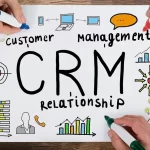Building and maintaining relationships with customers and clients is crucial for business success. Implementing a modern customer relationship management (CRM) system can streamline this process. To achieve customer satisfaction and better sales results, businesses should choose CRM software with specific key features.
A CRM system is a crucial tool for companies dealing with clients, providing a personalized experience and enhancing strategies. It allows for understanding customer needs, analyzing strategies, and streamlining tasks related to customer relationships. Automation, integrations, and customizations streamline these tasks, boosting marketing, sales, and customer service efforts. This allows companies to gain a competitive edge and stay ahead of their competitors.
Overall, a well-designed CRM system is essential for a business’s success.
An Overview of CRM Systems
A CRM solution provides numerous opportunities for businesses to thrive, especially in managing prospects and existing customers.
The market of customer relationship management software encompasses software applications that assist businesses in managing customer interactions throughout their life cycle, including sales, marketing, customer services, and contact centers. These applications can be purchased as on-premises software, sold via transactional license or subscription, or cloud-based software, typically sold as a subscription. The goal is to improve customer engagement, increase loyalty, and grow businesses.
After analyzing numerous CRMs and interviewing over 500 companies, it’s crucial to consider various functions and features before purchasing and implementing a CRM system.
Top 5 Features to Look
Here are the top 5 features that are most looked into in a modern CRM for SMEs business.
Contact Management & Customer Profiling:
CRM systems offer a wide range of capabilities, including contact management, which allows businesses to store detailed customer profiles, track interactions, and segment contacts. These profiles contain vast amounts of data, including contact details, job positions, IP addresses, estimated salaries, and more. A log of customer interactions can reveal purchasing habits, pain points, recent inquiries, and feedback, making personalized marketing easier. Combining personal data and interaction history gives businesses a comprehensive understanding of their customers, enabling them to segment their database into categories and customize sales journeys for better results.
Sales Pipeline Management:
Sales pipeline management features in CRM help track and optimize sales processes by providing a visual representation of stages, enabling customizable workflows, offering probability-based forecasting, supporting deal tracking and management, generating pipeline reports and analytics, and automating stage progression based on activities. This feature enables sales teams to focus on closing deals, while lead scoring, a basic CRM feature, helps identify customers most likely to convert, streamlining sales/marketing teams and improving efficiency.
Reporting and Analytics:
CRM solutions are essential for staying competitive and enabling data-driven decision-making. When set up correctly, CRM analytics tools gather data and produce detailed reports and forecasts, allowing for informed decisions to achieve goals and strategies. These tools affect the three essential components: sales, marketing, and customer service. Sales teams can use data to identify trends, best-selling products, and untapped potential. Marketing departments can assess the best return on investment and allocate resources more effectively. Customer service agents can study interactions and identify pain points, preferences, and common complaints. These analytics not only provide historical data but also forecast future trends, making robust analytics a top priority in CRM systems.
Customization:
Customizable CRM systems are essential for businesses with unique workflows and processes. These systems allow for the customization of everything from sales pipelines to data fields, ensuring alignment with business operations. Customizable dashboards and reports allow for focus on key areas like sales team performance, customer data analysis, and KPI monitoring, providing insights for informed decision-making. This ensures a seamless integration with your business operations.
Integration:
CRM systems are essential for customer relationship management, but they don’t exist in isolation. Marketing teams need to create tasks for new customer segments, which should be handled in a project management workflow. CRM integrations allow data to flow freely between systems, ensuring consistency and reducing error margins. Native integrations are particularly helpful as they work in tandem. As businesses grow and evolve, an all-in-one business platform is better prepared to work seamlessly despite updates, making it easier to manage and update data.
Ending Thought
When choosing a CRM system out of the best CRM systems, it’s crucial to consider its alignment with your business objectives and processes. The ideal CRM should not only meet your current needs but also support future growth. Prioritize user-friendly interfaces and features that directly address your specific challenges. Thoroughly evaluate options and involve key stakeholders in the decision-making process to ensure successful implementation. Buyers want CRM to manage customer relationships, improve processes, and streamline processes. They need features like contact management, interaction tracking, and pipeline management. They also want higher automation rates in their sales process, including workflows, sales force activity, and marketing functions. They want an integrated, all-in-one system that is easy to navigate for both users and customers.







0 Comments